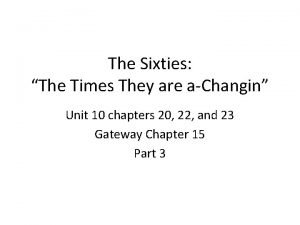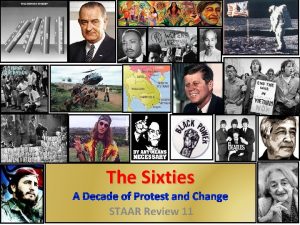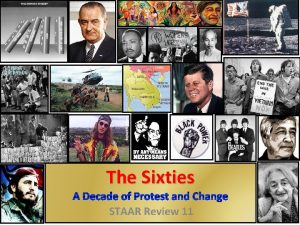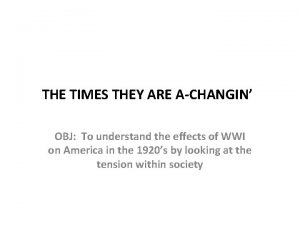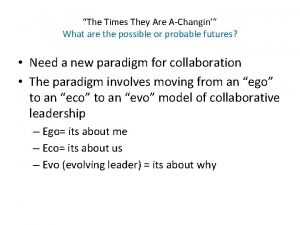The Sixties The Times They are aChangin Unit







- Slides: 7

The Sixties: “The Times They are a-Changin” Unit 10 chapters 20, 22, and 23 Gateway Chapter 15 Part 3

VII. A Divided Home Front A. As the war dragged on, the home front became divided. 1. “Doves” thought the war was immoral and wanted the US to withdraw. 2. “Hawks” wanted to continue the war to stop Communism.

B. The Vietnam War was the first televised war. 1. The media covered it closely, but the government sometimes twisted the facts to impress the public. 2. This led to a “credibility gap. ” 3. Distrust in government grew, especially when Nixon tried to conceal the Pentagon Papers, a secret government war study.

C. The “Baby Boom” generation created a new , anti-conformist Youth Culture in the 60 s. 1. Some created radical groups like SDS; 2. Others experimented with drugs like LSD 3. Others became “hippies”

D. Many students became political 1. They resented the draft and the war. 2. In 1968, a protest at the Democratic National Convention turned violent. 3. In 1970, National Guardsmen killed students at Kent State University. 4. Government and police violence only increased resistance.

VIII. Consequences of the Vietnam War A. Vietnam suffered the most from the war. 1. more than a million Vietnamese were killed 2. villages, cities, and farmlands were destroyed. B. 58, 000 American were killed. Others were badly injured and/or suffered psychological trauma. C. The Communist Vietnamese regime was repressive, and many fled. Some came to the U. S.

D. In Cambodia, the “Khmer Rouge” won power and committed acts of genocide. E. In America, war expenses ended many of the “Great Society” programs. 1. Americans lost faith in their government and in the power of the military. 2. American youth were especially disillusioned. F. Congress passed the War Powers Act in 1973, limiting the President’s power to commit troops overseas without Congressional approval.
